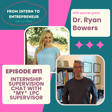Become a Creator today!Start creating today - Share your story with the world!
Start for free
00:00:00
00:00:01

Episode 12: The Tinder of Supervision with Dr. Amy Fortney Parks (The Clinical Supervision Directory!
Click here to join the From Intern To Entrepreneur Facebook community!
From Intern to Entrepreneur is the podcast for counseling graduate students (and other grad students in mental health fields) to start planning their journey to private practice while they're still in graduate school! Host, Cori White, started planning her journey while she was still in her graduate program and it paid off BIG to start planning EARLY.
In this episode of From Intern to Entrepreneur, Cori interviews Dr. Amy Fortney Parks and they talk about post-grad supervision and the Clinical Supervision Directory!
More about Amy:
Dr. Amy Fortney Parks is a licensed therapist with more than 35 years of experience in the mental health field. She is an LPC and a Nationally Accredited Clinical Supervisor.Dr. Parks has a Doctorate in Educational Psychology with a specialty in developmental neuroscience. She is a Child & Adolescent Psychologist as well as the founder and Clinical Director of WISE Mind Solutions LLC and The Wise Family Counseling, Assessment & Parent Coaching in Virginia. She is also the founder of the Clinical Supervision Directory www.clinicalsupervisondirectory.com – a connection super-highway for supervision-seekers working towards licensure in counseling and social work across the US.Dr. Parks serves as a Clinical Supervisor for Virginia LPC Residents, as well as an Adjunct Assistant Professor at The Chicago School of Professional Psychology. Dr. Parks is a frequently sought-after parent coach and speaker for families and groups around the world.Dr. Parks is a native Alexandrian and the mother of four children between the ages of 22 and 28, as well as a Mimi to an almost 4 year old. In her spare time, she loves to read teen fiction, cook and hang out with friends who have boats! You can connect with Dr Parks on social @dramyfparks.Transcript
Podcast Introduction
00:00:00
Speaker
This is from intern to entrepreneur, the podcast for counseling and therapy graduate students who want to start planning their journey to private practice while they're still in grad school. I'm your host Corey White.
Planning for Success in Private Practice
00:00:11
Speaker
And within three years of graduating from my master's program, I had a six figure thriving private practice in large part because I started planning my path while I was still in grad school.
00:00:21
Speaker
This podcast is full of stories and information meant to give you ideas about how you can carve your own path to the therapy career that you
State Licensure Laws: A Reminder
00:00:29
Speaker
want. Please note that when you're listening to this podcast, licensure laws and requirements vary from state to state. So check with your state board about what you can and can't do on your journey. And without further ado, enjoy this episode of From Intern to Entrepreneur.
Introducing Episode 12 and Dr. Amy Fortney Parks
00:00:46
Speaker
Oh, hey there, grad students. This is episode 12 of From Intern to Entrepreneur. Last week, if you tuned in, I interviewed my old LPC supervisor, Dr. Ryan Bowers. It was a really cool interview, because I was interviewing my old supervisor. But we're continuing the supervision train today, where I am interviewing Dr. Amy Fortney Parks. And she is a cool woman. She's also very funny, which I appreciate as a guest on this podcast.
What is the Clinical Supervision Directory?
00:01:14
Speaker
But the reason I have her on
00:01:16
Speaker
is to talk about post-grad school supervision and the clinical supervision directory which is a directory that she founded for supervisors and supervisees to connect which is so mind-blowingly amazing as someone who had to search for their own supervisor who did the niche thing that they were looking for and who would support me in private practice
00:01:39
Speaker
It's really amazing that there is a directory now where you can go on and make your life easy, way easier than the way it used to be in the olden days like six years ago. She also calls it the Tinder of Supervision, which she says it in her interview and I am latching onto that. I think it's hysterical.
00:01:59
Speaker
But she's not just the creator of the Tinder of supervision. She's also a child and adolescent psychologist.
Meet Dr. Amy Fortney Parks
00:02:06
Speaker
She is the founder and clinical director of Wise Mind Solutions and the Wise Family Counseling Assessment and Parent Coaching in Virginia. I hope that you love this interview as much as I love doing it. And without further ado, grad students, meet Amy.
00:02:25
Speaker
Hi, Amy. Thank you and welcome to the podcast. Thanks, Corey. I'm excited to be here. Yeah. So I want to start with you. Like I start with everybody, which is tell our listeners a little bit about your journey, where you started and how you got to where you are and the different things that you're doing now.
From School Psychologist to Group Practice Founder
00:02:42
Speaker
Well, let's see, how long do we have? Because I am ancient. Let's see. So I started my career as a school psychologist and a school counselor a million years ago. And I left the school environment and went into private practice in the early 2000s. And after a while, I had more clients than I knew what to do with. So I started a group practice.
00:03:11
Speaker
And so I have a group practice now called the Wise Family, and we have 17 staff members, which is fantastic. And we have a
00:03:26
Speaker
a pretty diverse group of people that work with us. We see children, teens and families. And along the way, as I was becoming a clinician and working in the field, I also became a supervisor. So I have been a clinical supervisor now for about eight years. And I primarily now run the group practice and I work as a supervisor and most recently have started a membership
00:03:55
Speaker
directory connection superhighway
Understanding Supervision in Therapy
00:03:57
Speaker
to connect supervision seekers to supervisors. So that is really sort of my journey and the connection to supervisors is sort of my, I guess,
00:04:08
Speaker
legacy if you want to sort of put it that way. I'm in the generativity stage of Piaget's developmental stages. What a supervisor too to just connect that on in this conversation. Yeah, so that's a really interesting journey and I think it's really cool to hear the different ways in which you can use your
00:04:32
Speaker
clinical education and take your career in different paths. Since this podcast is geared toward people in graduate school, how would you define supervision? What is supervision? Some of these people might be in their first semester and they're going like, wait, I haven't heard about that yet.
Career Path Insights in Counseling
00:04:50
Speaker
What is supervision? Well, the funny thing is for people that are in graduate school, I didn't even know when I was
00:04:58
Speaker
in undergrad. So I was a triple major in undergrad. I was in education, psychology, and English triple major. I didn't even know that there was such a career as counseling in schools because my school, when I was in high school, back in when dinosaurs roamed the earth,
00:05:18
Speaker
They didn't, we didn't have that. That wasn't like a thing. You know, you had someone that helped you get into college, but they didn't help you with your mental health. No one cared about your mental health back in the eighties. They didn't, it wasn't a thing. And so I didn't even know that was a career until much, you know, like after I graduated from college and I sort of started to understand that there was more that was kind of a career path in schools. And so,
00:05:43
Speaker
Then I went to graduate school and my grad school was degree was in psychological services. And so I was able to get a degree working in schools. And then during that time, I also found out that there was a career path that was separate schools and community counseling.
00:06:05
Speaker
But back in the day when I was in grad school, I didn't realize, like no one, when you're in grad school, you don't know what you're gonna do 15 years down the road. And so a lot of people start in the school counseling track and they don't know that they may later want to become a community-based counselor. So I didn't realize that that was gonna,
00:06:31
Speaker
No fault of my own, but I didn't know that I would later on want to go into private practice.
The Importance of Supervision and Licensure
00:06:37
Speaker
So by the time I had worked in schools for 20 years, and I wanted to then get supervision to answer your question, to be able to be licensed as a clinician in my state, I had to be grandfathered in.
00:06:51
Speaker
And most of my professors were dead by then. And my, they had no trans, like the transcripts, they had to dig up from the dusty basements of my university. You know what I mean? So, my advice to grad students is, number one, keep your transcripts. And number two, find out about all the career sort of options that are around sort of what interests you. And so supervision is one of those things that if you want to go
00:07:18
Speaker
in particular career paths understand what the licensure requirements are for that. Just like if you want to go to law school, you have to know you have to take an exam.
00:07:28
Speaker
And then you have to go down a certain path. If you want to go to medical school, you have to go down this certain path. If you want to become a plumber, you have to go down this certain path. So you don't just get to graduate and just start doing therapy, at least not in most states. There are a few states where that is actually true. But most states, you don't get to just do that. And so even if you're in one track, if you have some interest in a variety of
00:07:57
Speaker
big areas, like maybe you might want to work in schools, but maybe you might want to work in the community. Just know a little bit more, ask people, find people that are in those careers, and just kind of find out, hey, what
Advice for Graduate Students
00:08:11
Speaker
do I not know that I might want to know looking ahead?
00:08:16
Speaker
And when you say in the community, you're talking about like more traditional psychotherapy, like talk therapy. Yes, yes. Like if you're working for the CSP or you're working in private practice or you're working in the hospital versus a school for, for example. So like working, because those are very different certification tracks and very different like licensure tracks at the grad school level. So my work has been in both areas. So I'm very familiar with both.
00:08:43
Speaker
areas. But now my work is specifically with working with people that are in the community or, you know, like LPC social work, you know, license track working in the community. Sure. Or in private practice.
00:08:59
Speaker
Yeah, absolutely. And so what I hear you saying is essentially, know what your next steps are, depending on like, which track that you're going. So like, if you're going to be if you're a school counseling in graduate, but you're thinking about doing private practice, knowing that there's different qualifications or different requirements
00:09:20
Speaker
for those two different paths. Yeah, but I don't want people to freak out like, oh my God, I don't know. I don't know what I want to do yet. I don't want people to freak out. I just want people to know that there might be more to the next step.
00:09:35
Speaker
So look around, keep your eyes open, talk to people that are in those careers, and don't be afraid of that. Because when you're talking to professors, you're talking to people in the field, talk to your parents' friends that are in that job. Talk to people that you know that are in that job.
00:09:54
Speaker
Talk to people at your university, they're in those jobs. Because here's the thing, if you're in a career, if you're looking at a career field working as a licensed clinician like we are, when you graduate, you still have 200, sometimes a minimum of 200 hours or 4,000 hours of face-to-face contact and 200 hours of supervision before you're even licensed.
00:10:19
Speaker
When I tell some students that when they start grad school, they lay down on the ground. I mean, that is just overwhelming, the idea of that. But there's a process and a reason for each step along the way, just like lawyers and doctors and other people that are serving the greater community because we have
00:10:42
Speaker
ethics and responsibilities and guidelines that require us to take care of people in a certain way.
The Role of Supervision in Professional Growth
00:10:49
Speaker
Why do you think that you ended up in this realm of sort of specializing in supervision? Well, I've always loved teaching.
00:11:01
Speaker
And so I've always loved education. Those are always been really important things to me. I'm very sort of CSI of the mind oriented. Like I'm always thinking about what other people are thinking. That's really like fascinating to me. And I've been doing this work for a really, really long time. So when you are doing something for a long time and you get really good at it, people start asking you for advice.
00:11:31
Speaker
As a therapist, that's not our job. Giving advice is not what we do, despite what people might think. So giving advice is not, but I love to give advice. That is one of my favorite things to do. So I think that I realized that I couldn't give advice if I was doing a lot of therapy. So I realized supervision was better for me because I could give more advice.
00:12:00
Speaker
better. It suits my personality because a supervisor is doing consultation and teaching and a slight bit of counseling on the back end there to support the supervisee. So there's a bit of advice giving there in terms of supportive that I think suits me in a little bit of a different way.
00:12:27
Speaker
This is certainly a different part of my brain. That just popped another question for me. From your perspective, what is good supervision? Well, it's exactly that. It's a nexus of those things. It's a combination of consultation and teaching and counseling.
00:12:53
Speaker
It's not that you are providing counseling for your supervisee or you are providing teaching, but you are always providing some degree of a little bit of each of those things. Because sometimes you have to help your supervisee see where they might be experiencing some counter transference, which might mean bringing about some awareness that comes from using counseling skills.
00:13:22
Speaker
you may be pointing out something that they need to learn and research without necessarily teaching it, but pointing out using teaching and education skills. You may be talking through an experience that helps in a way that is using consultation strategies to help them get some insight. So again,
00:13:48
Speaker
Supervision isn't doing the work for the supervisee, but it's helping them see how they have to work in a different kind of way to gain their own insight into what they're trying to accomplish with the client.
00:14:03
Speaker
Yeah, as you're describing that, something that's coming up for me as I think about my work with supervisees is you can see things that they can't see yet because they don't even know they should be looking for them. Right, exactly. So a lot of times when I consult, as I work primarily with couples, I do a lot of consultation with my supervisees around couples. And so I'll listen to how they're talking about their experience with a couple that they're working with.
00:14:29
Speaker
And I can hear things and see things in the way they describe it that they don't even know they should be looking for. And also it's blind spots in themselves. Right. So yeah, I think that's a really interesting way that you just described that. And it's very different too with new clinicians versus more seasoned clinicians.
Challenges for New Clinicians
00:14:50
Speaker
Now, supervision
00:14:51
Speaker
generally is only necessary through a certain sort of period of time for a supervisee. So supervision versus sort of case consultation is two different kinds of things. So supervision usually doing until somebody becomes licensed and then case consultation would be like you and I talking about something we're both licensed.
00:15:12
Speaker
or both seasoned clinicians and we're like, I'm super stuck on this, what do you think? But it's still about, hey, listen, well, I've seen this or have you thought about this or what about this? But it is about seeing something from a different lens or thinking about it a different way. So like I had a clinician the other day who is relatively new, so this made some sense, but also they were working really hard, way harder than the client.
00:15:41
Speaker
on a particular task, trying to get the client to sort of share something verbally, that this client was too young to really be able to share verbally. And they were just frustrated because they thought, we're just playing, like we're not doing any work. And so that was what they said to me, like, we're just playing, we're not doing any work. And so as a consultant, I was able to sort of point out
00:16:11
Speaker
the connections that they were making. Then as an educator in my teaching role, I was able to share how play is the language of children. And then in my counseling role, I was able to point out that part of what they were experiencing was their own frustration because they felt like they were not good enough. And that actually play, they were doing a perfectly adequate, if not more than adequate job because
00:16:40
Speaker
the child wasn't ready to be verbal. And they needed probably 10 more sessions of just playing Barbies before they were going to get to any actual work. And actually they were actually doing the work anyway. So I was able to sort of do that. And they were like, oh, it was a very gratifying experience, I think, for them to be validated in what they were seeing. And I don't think that they would have gotten that unless they'd had that opportunity for supervision.
00:17:08
Speaker
Absolutely. And I think the point you're making about newer clinicians versus more season one is right on. And yeah, you had this clinician who is coming from a graduate program.
00:17:20
Speaker
who says the textbooks say it looks like this, but the textbooks can't account for every dynamic and every relationship. And so it wasn't moving as fast as the person you were working with thought, but a textbook's not going to tell you that because it's such a unique dynamic from case to case that
00:17:39
Speaker
You can see that unique dynamic, right? But this person has never read a case conceptualization in a textbook that says, and we played Barbies for 10 sessions. Right. Anything that you read that said that would have thought you were just totally wasting your time. What a joke that is. And then the consultation part of things with other colleagues, people call me all the time and they say, do you think I should call CPS on this?
00:18:06
Speaker
And then we talk it through, like, well, what do you think?
Value of Group Supervision
00:18:09
Speaker
Well, duh, duh, duh, duh. Should we tell the parent in advance? Well, I don't know. My policy is yes, you always tell the parent in advance. Other people's policy isn't that. There's always conversations. My lens looks at it this way. Well, I have a trauma-informed lens. And I think about it this way. And I just love that. That is such a powerful way of non-siloing our profession.
00:18:36
Speaker
when it's so necessary. Yes, and I love talking to supervisors like you who have a whole conceptualization of what they're doing rather than I've talked to some people who've had their supervisors just sort of be validating. Yeah, that was a smart choice. That was amazing. You're doing so good. That's important. We need to definitely build people up, but we also need to help them understand
00:19:02
Speaker
things that they can't see because if you do supervision in a certain way, it will teach you how to do case consultation when you don't have a supervisor. You don't know how to have conversations like that in one year when you get stuck on something. You're not going to know how to have those conversations with a colleague.
00:19:23
Speaker
I guess I'm doing it right. And I'm so glad you mentioned that because I can't tell you how many supervisors I talk to who don't do group or dyads.
00:19:34
Speaker
And I think that's a huge mistake. I think it should be a standard of care, like if there's such a thing, a standard of supervision that supervisees should be required to be in a dyad or group for a portion of their time. It doesn't, obviously not the whole time. Right now, most states say you can be in a dyad or you can be in group for a portion, but I think it should be required because that is
00:19:59
Speaker
a very, very valuable opportunity to learn how to consult with a colleague and maybe even respectfully disagree. Oh, absolutely. Or agree, or just get a chance to sort of talk it through and figure out what to say and how to say it.
00:20:19
Speaker
be succinct in your description and take feedback and all of that, it's so valuable. Well, and also then how to teach too, right? Sure. I was in a group supervision during my supervisory experience where people had different specialty areas. And so if I brought up this client that I was seeing that had this issue, which is not something that I have ever dealt with before, there was someone else in the group that could say, here's what I know about that. Right. So yeah, it's then teaching.
00:20:49
Speaker
Yeah. Good supervision then can teach you how to also be a good supervisor, be a good consultant, all of those things. And that's not a standard. So I'm hoping to sit on the ACES Committee for Supervision Standards, and I think it should be a standard.
00:21:04
Speaker
Hey, grad students. Real quick, before we get back to this interview, if you are loving the idea of being a part of a community of like-minded graduate students who want to own their own private practice one day, then you need to head to Facebook and join my Facebook group from intern to entrepreneur. There's already a community set up of graduate students who one day want to own their own private practices and be entrepreneurs just like you.
00:21:31
Speaker
So head over to Facebook, join that group and stay in the loop and get connected with people who are doing things that you want to do. Back to the interview.
00:21:43
Speaker
Yeah, and so for people that are listening, this is something to keep in mind that when you go to look for a supervisor, ask some questions about whether or not there's a group component. Or ask some questions about, okay, if you don't have a group component, are you aware of anybody in the area that does where I could get a supplemental experience?
00:22:03
Speaker
Absolutely. I do think it's pretty invaluable to have had the experience of being in a group of clinicians for that, and I hadn't thought about it until you had just said it. I know an easy way to get more hours, and it's like, no, it's invaluable. Exactly. And I know a lot of supervisors who are like, oh no, we don't do group, or oh no, we don't support them. And I'm like, why?
00:22:27
Speaker
Like, why would you not? And from the perspective of a supervisor, why would I ever not do dyads? I mean, what I generally do is I'll do three dyad, I'll have a group, I'll have people like in twos, I'll do three out of four sessions a month as a dyad. So I'll have them as individuals once a month, and then I'll have them as a dyad, because dyads in Virginia count as an individual session.
00:22:51
Speaker
Oh, that's cool. They're going to be in a diet three times in a month. And once a month, they'll be individual. Now, if they want an individual session for some particular reason, no problem. I'm not going to say no. But I want them to have the experience always of supporting other colleagues, hearing from other colleagues, always seeing other colleagues' notes, always talking about other cases with each other. Because I think it's just hard to be by yourself and always
00:23:20
Speaker
being on your own, but then also we run groups on the weekends or other different times so that they are in a bigger group as well. And I don't know why you wouldn't do that. It just makes sense to me. Yeah, I totally agree. Well, let's ask the flip question then from your perspective, what is bad supervision?
Warning Against Bad Supervision Practices
00:23:41
Speaker
Not knowing the regulations of your state. Oh my gosh. Can I just pause you right there?
00:23:48
Speaker
That is, this really does deserve a pause. Yes, let me just state this very clearly.
00:23:55
Speaker
If you're listening to this and you need to find a supervisor, the first question you should ask them is what you need to do to be able to get licensed. And if they don't know the answer to that, keep it moving. Hang up the phone. Keep moving. Right. I've talked to a few people who have been in that situation and actually I know someone pretty personally who got to the end of what they thought were their hours.
00:24:19
Speaker
and then had to do more because the supervisor didn't know and was not preparing them adequately and didn't answer the questions. Yeah, so that person ended up paying a lot more money for supervision because of that experience. Now, I'm going to say, I will fully admit that in Virginia, I'm in Virginia, they frequently change the rules.
00:24:42
Speaker
So right now, you can send in your paperwork at the end of your supervision. You can send it in digitally. And then they also require you to send in some by paper. And you can actually send it all in by paper. And it's possible that you can send it all digitally. But I'm not 1,000% sure about that. But what I tell people is, send it all in by paper.
00:25:08
Speaker
and send anything you can possibly send in digitally and make an entire copy of every single thing you send it. Yeah.
00:25:17
Speaker
So that's the only thing I don't know about supervision in Virginia. And frankly, they changed it so much that even if I ask the question today, they'll probably change it tomorrow. So it will not help me. Otherwise, I think I pretty much know everything. But that's the number one thing that I see as problematic is not knowing how to get licensed or the supervision rules of your state. Yes. And to your point, there is a big difference between knowing the requirements for licensure and
00:25:45
Speaker
knowing this move by move that your state board is making. The state boards in Pennsylvania, it's like they couldn't make things more confusing and language and things like that. So yes. But in that vein, it sounds like what you're doing though is trying to encourage, here's all the ways in which we can get around this confusion. Exactly. Make all the copies of all the things and do all the, yeah.
00:26:08
Speaker
make all the safeguards and then i think the second thing that is the most kinky to me about supervision are the people that accept people into supervision who are either already they know are already violating some kind of ethical boundary because they are either
00:26:27
Speaker
already in private practice and they're not supposed to be in their state, which is in general not allowed in most states, but is in some allowed, and they go ahead and they start supervising them. So they already start by breaking an ethical boundary, or they as a supervisor break some kind of ethical boundary by, you know,
00:26:52
Speaker
becoming best friends with them, going out for drinks with them, inviting them over to their house, having them babysit, having them, you know, like whatever, some other kind of way of maybe not inviting them over to their house, but in general, having some kind of
00:27:07
Speaker
significant boundary violation, you know, asking them on a date, like, you know, things like that. Those are, I see that actually kind of a lot. So yeah, and that's the other red flag. Yeah, well, for graduate students and new clinicians listening to this, yeah, aware that like, they should be paying just because someone is licensed does not mean that they are being ethical. It does not mean that they are amazing.
Ethical Concerns in Supervision
00:27:33
Speaker
That they should feel empowered that if there if there is a red flag that they're noticing then they should be consulting with other people like hey Is this a red flag at my this my potential supervisor or my supervisor is is is displaying? Yeah, so yes, that's that could be a whole podcast episode on the ethics of of supervision of supervisors and
00:27:55
Speaker
Yes, actually, yes, absolutely there should be. And there absolutely should be no reason why you shouldn't feel like you can speak to your board about a question you have about an ethical violation. You should always be able to speak to another supervisor or a colleague or anybody if you feel like something feels just off. Don't ever hesitate to speak to somebody because
00:28:24
Speaker
It's really, you just don't know. Yeah. Yeah. That's awesome.
Creation of the Clinical Supervision Directory
00:28:30
Speaker
So I want to talk a little bit about your directory because I think it's super, super cool. Me too. Yes. Tell me how that got started, why you started it.
00:28:40
Speaker
and how you're hoping people use it. Absolutely. So along the way of my journey as a supervisor, for me and for many, many people, finding a supervisor is really challenging.
00:28:55
Speaker
And when you graduate from graduate school, as many of your listeners probably realize, it's really difficult to figure out how to find a supervisor. Most states, all states are required to credential supervisors, but they have no obligation to list who they are. And so most states don't have a directory or a listing of any sort. And if they do, it's pretty inadequate.
00:29:20
Speaker
And so I'm not saying they don't try it. I'm not trying to throw states under the bus, but it's a big job to keep track of all the people doing all the things. So when you graduate from grad school, you don't even really know what to look for. Waiting through the board websites is challenging in and of itself. So when you're looking for a supervisor, a lot of times you go with your employer,
00:29:48
Speaker
If you have an employer or you ask a friend of a friend or maybe a professor might suggest somebody or you just get lucky. But the fact of the matter is those are all ways of finding a good restaurant or a new coffee shop those aren't the ways to find the person who's going to guide your professional career.
00:30:06
Speaker
And so i wanted to create and i was hoping someone else had done it but i will i really wanted someone i was hoping someone had created a way for grad students to be able to a new license the supervision seekers who might not be grad students people that might even just have decided this is they want to pursue this career.
00:30:25
Speaker
to be able to go to one place and find supervision anywhere in the US without having to go to each siloed state board throughout every single state and try to search through and find some kind of mystery list. And I looked and looked and looked and looked and looked, and I couldn't find it. It didn't exist. Now, a couple states have their own list, but there was no national directory of this, none, at all, anywhere.
00:30:54
Speaker
A couple of different organizations do something sort of similar where they employ supervisors and they kind of aggregate people together. But again, there's no directory that specifically solves this problem. And so I wanted one URL where if you were looking for supervision, all you had to do was type it in
00:31:21
Speaker
put in your state and anything else you wanted to put in. If you wanted to put in they spoke Spanish or you wanted to put in that they had a specialty working with maternal health or they were EMDR certified or they're in private practice versus maybe working in community mental health. Just, you know, whatever other little parameters you wanted to put in.
00:31:42
Speaker
You could put in a URL, the state, multiple states, whatever, social worker, counselor, whatever, and it would list all the supervisors that met your criteria. I wanted something that was like the tender of supervision without the dating, because there's no dating. We've already had this ethical conversation part, right?
00:32:03
Speaker
And so, um, I just decided I mortgaged my house and I said, I'm going to make this cause it doesn't exist. And I, and I can't believe it doesn't exist. And I asked friends of mine, I'm like, should I do this thing? Because I just can't believe it. It doesn't exist. And they're like, yeah, you should do it. And I told my accountant, I said, I'm going to do this thing. I just don't, I don't think it's a real business or anything, but I'm going to make this directory thing. Should I get an LLC? And she's like, uh, yeah, I think that's like a real business.
00:32:31
Speaker
And it actually became like a real business. It's a real thing. It's actually become quite.
00:32:39
Speaker
been on the website, it's great. It's become quite the beast. It's become quite the thing. And so yeah, so we now are, we are quite the thing. We are, it's like fishing in the Atlantic Ocean though. I mean, we are looking for supervisors and supervision seekers all the time. We have hundreds of supervision seekers every month coming onto our site. We're constantly looking for supervisors to join. So our goal
00:33:06
Speaker
is to auspiciously have every single supervisor in the US, social worker, RPT, EMDR, everyone on the directory, and to make it a value add if you belong to your state board, to make it a value add if you belong to NASW or ACA or any of the associations. If you join those, you can add a little extra money and you can join the directory if you're a supervisor.
00:33:32
Speaker
just to make it as easy as possible for everyone to be in it so that every student, that students 10 years from now or one year from now or as soon as humanly possible, won't have this problem anymore.
00:33:45
Speaker
And won't that be great? Yeah, and it really is. And then I can just not worry about it anymore. You'll find something new to worry about. But yeah, this problem will be solved. Right. So in Pennsylvania, you can start a private practice pre-licensed. And so I know for me, but you also have to be under supervision. So you can't just start a practice. But I bet people do. But anyway, go ahead. Yeah, maybe they do.
00:34:13
Speaker
Yeah, they might. Well, it's actually only been recent, recent-ish. I guess it's been a few years now that that was a thing that before you could just do it. It's only been maybe 2018 or 2019 that they've changed it. So it changed right around the time that I was starting my practice.
00:34:30
Speaker
and i decided i want to start a practice i said okay what have to find a supervisor is new i was going to pay for that supervisor and there was really just me going to a hundred and fifty websites to see if somebody on a private practice website said that they take supervisees and then it was finding a supervisor that.
00:34:49
Speaker
would also supervise me while I was starting a practice. And also if I was paying for it, I wanted someone good. So I wanted someone that I was interviewing and they were telling me about what they did and how they could add value to my career and my path. So I was definitely looking for a unicorn. I found him
00:35:10
Speaker
And I had a great supervisory experience, but like it took me quite a bit of time to all of those boxes checked. So yeah, if I get the directory, it may have been a lot
Improving Connections with the Directory
00:35:22
Speaker
easier. Well, that's the point. I mean, you know, because think about it. If you look at, if you think about what should be keeping our, you know, associations and our universities up at night, it shouldn't be getting counselors trained.
00:35:39
Speaker
We don't really have a problem getting counselors trained. We have a problem getting counselors licensed quickly and well. And the onus for that is on supervisors. So that means we have to have well-supported, well-trained supervisors available quickly and efficiently.
00:36:03
Speaker
That's what the CSD does, solves all those problems. Well-trained, well-connected professional supervisors who can be available quickly and efficiently to the people that are graduating right away. You can connect before you graduate with a supervisor.
00:36:20
Speaker
Oh, yeah. Before you graduate. Which I would recommend. Exactly, exactly. And here's another cool part. Say you were like, for example, in your group practice, you list yourself Corey White on the on the clinical supervision directory, and you can customize your own directory listing and you say, PS, you know, we're hiring.
00:36:42
Speaker
So I'm a grad student and I'm thinking, well, I'm moving to Pennsylvania and I live in her town or I'm gonna live nearby. She's hiring and she's looking for supervisees. Like I'm on that. That's so it becomes an employment engine as well. Yeah. All of those things are so wonderful that you've created something that is going to make so many people's lives so much easier.
Tips for Optimizing Directory Use
00:37:11
Speaker
We can get there. We'll get there at some point soon. Yeah, no, it definitely will. Are there any tips or tricks that you have for people to best utilize the directory, whether that's for supervisors or supervisees?
00:37:27
Speaker
Well, for supervisees, I would say, well, first of all, I would say anyone that uses the directory and has feedback for me or feedback for us. I am just a clinician. I am not like super marketer. I'm not like the queen of all the, I don't know anything. I'm just a clinician. Like, I just, I don't know anything. I just am winging this.
00:37:50
Speaker
So please email me and say, hey, it would be so cool if you could do this. Hey, how about this? Could you try this? How about fixing this? Like just give me all the feedback. So first of all, I would say that I have a very thick skin. And second of all, I would say if you're a supervision seeker,
00:38:08
Speaker
absolutely sign up and look often because don't give up on the first time and email us and say, hey, listen, you don't have anybody in Minnesota. What the heck? Because we can go on, we have thousands, we have over 5,000 people on our Instagram.
00:38:24
Speaker
We have a 7,000-person email list. We're connected with all K-credit universities across the U.S. We can say, hello, Minnesota. Where are you? Who's out there? We have contacts in every state. So say to us, hey, listen, we need somebody in Minnesota. Help us. We will help you try to find someone.
00:38:43
Speaker
They have huge connections. We just might not have anybody in your state yet because, again, we're fishing in the Atlantic Ocean and it's a big, big ocean and we're only on a little rowboat. Yeah. If you're a supervisor, I would say, optimize your listing to make sure it tells your story, like who you are and what makes you who you are.
00:39:07
Speaker
Tell us that, you know, tell us who you are. Tell us, talk to us because we can feature you as well. Make sure that we put you on our social media and in our newsletter, you know, connect your directory listing to your social media, to your LinkedIn, to your website, because our SEO is fire. And if our SEO and your SEO talk to each other, it's like a bat signal.
00:39:32
Speaker
And that's a really, really powerful way to connect to each other. And so that when somebody Googles supervision in Pennsylvania, it should come up with your name in mind. And so people don't think about that, but that's a pretty powerful thing. And so even if you're not looking for supervisees, here's the thing.
00:39:55
Speaker
This is a community. So when you're a supervisor in the clinical supervision directory, we are launching in August a Facebook group that's just for supervisors. And so that will be for anybody that's in the directory, they will be in that Facebook group. But you get also free CEs through the supervision directory. And we're gonna have case consultation through there, which we're just getting ready to launch this fall. So lots of opportunities just to connect
00:40:24
Speaker
even if you're not taking on supervisees. So don't think that, oh my gosh, I don't really want any more supervisees because I get that too. Sometimes we don't, we just have too many. We don't need any more. I get that. And there's never a time when you don't need to connect with other supervisors. So the community is so valuable.
Resources for Supervisory Success
00:40:43
Speaker
I mean, for $200 a year, it's unbelievable. Like just for the CEs alone is worth the money. Yeah.
00:40:51
Speaker
for people listening, what I would say is, okay, if you're looking for a supervisor, hopefully that's a one and done thing. Hopefully you go- And that's free. Free for anybody. Yeah. So hopefully that's a one and done thing where you go to the website, you find your supervisor, and then you don't think about this directory again until you should bookmark it so that in a few years, when you get to the point where you're able to do your own supervision, that you return to this and you go, now I'm going to use this website on the other end as a supervisor.
00:41:21
Speaker
But yeah, and actually you should bookmark it for when you get licensed because you'll need two to three CEs and ethics every year, which we will continue to provide in perpetuity. And when you want to become a supervisor, we provide the CEs to become a supervisor.
00:41:37
Speaker
So you'll be able to get your CEs to become a supervisor there. You'll be able to get CEs in ethics all the time. So people will always have access to that. And those CEs are available for supervisors through the directory all the time. I talk a lot about planting seeds that some of them don't grow because their incubation period is longer or whatever. I don't know much about plants, actually.
00:42:02
Speaker
Uh, but you, I always encourage everybody to like in your tabs, having a favorites folder of for future. And so smart this in your for future so that every now and then when you look at it, you get to go, Oh, am I there yet? Not quite, not quite, not quite. So you should be planting that seed right now. Excellent. Use it for yourself in the future. So, all right. Last question I always ask people is.
00:42:28
Speaker
What is one piece of practical or mindset advice that you would give a new or aspiring clinician who is interested in an entrepreneurial journey?
00:42:40
Speaker
I would say never be afraid to ask questions of people that you admire and or that you see who are doing a thing that you like or maybe want to do. If you see somebody on social media or in real life or
00:43:01
Speaker
anywhere that they're doing something, even if they seem like they're famous or whoever they are, it doesn't matter. If you see them doing something, ask them. Don't be afraid to try to ask them. If you can't feel like you can ask them or you don't feel like they're going to answer you or whatever, spend a little time observing them and write down what they're doing.
Learning from Role Models
00:43:24
Speaker
Copy their path because
00:43:28
Speaker
People's paths leave clues.
00:43:33
Speaker
to their success. And so ask for the path, ask for the map to their success. And if they, if you don't feel like you're gonna get an answer because maybe they're like Beyonce and they're not gonna answer you, so just give up on that one. But look for the path to her success and say, okay, this is where she started and then she did this and this and this. Okay, I'm gonna take those, and then I'm gonna make those tabs that say for my future self, I'm gonna be doing this.
00:44:03
Speaker
And so those success steps just lead clues that take you to your end goal, but never be afraid to ask. Yeah. Love that. Absolutely. Well, thank you so much for being on and for talking about supervision and the directory. Thank you. It's going to help so many, so many, so many, so many people. And we'll have to have you back in the future to talk more about different pieces of supervision because
00:44:26
Speaker
It's just a huge topic that graduate students need to know about. So thank you. Absolutely. Maybe we can do like a supervision series. That'd be super. Yeah, that'd be fun. Love it. We'll chat about that then. Thank you so much, Amy. That's great. All right. Take care. Thanks.
00:44:41
Speaker
I hope that you loved this episode of From Intern to Entrepreneur, and if you want to learn more about what we talked about, check out the show notes. If you love this podcast and you want to support me in continuing to create content for entrepreneurs, then please share this with a friend, a grad student who you think might want their own private practice one day, and also like, subscribe, and review this podcast wherever you're listening to it.













